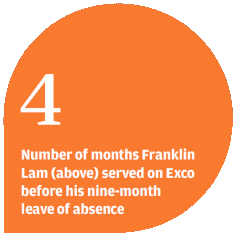
Exco resignation sparks fears over recruiting from industry
Franklin Lam's resignation from Executive Council raises questions over ability to recruit from industry and highlights probity issues
Executive Councillor Bernard Chan says he is worried the government may face difficulty bringing in outside talent following Franklin Lam Fan-keung's resignation, but fellow executive councillor Regina Ip Lau Suk-yee says she believes there are still many people willing to enter what she called "the hot kitchen".

Ivan Choy Chi-keung, a political scientist at Chinese University, said Ho's resignation might add pressure on his boss, Paul Chan, who is embroiled in a conflict-of-interest row over his family's ownership of land in the same area as the Ho family's, which is zoned for a new town.
"I think it's a good thing that [the Justice Department] has cleared the name of my past colleague Franklin Lam," Chan said. "It's unfortunate that he decided to leave, and it also shows that it's not easy to bring in outsiders, whether into the Exco or the government.
"I myself have total sympathy with [those reluctant to join the government]. You could be very successful in business, engineering and so on, but coming into the government is completely different. Public perception and expectation is very different."
Dr Li Pang-kwong, director of Lingnan University's public governance programme, said the resignation could have a positive effect on public governance.
"Appointed officials and Exco members will be more careful to make sure they don't have potential conflicts of interest before assuming their posts," he said.
Lam quit as an executive councillor on Thursday, even though the Department of Justice decided not to prosecute him over allegations of misconduct in public office and offering illicit advantages.
Ip said there was nothing to worry about and that Lam's decision to step down was a good one.
"I think that in the future there will be high-calibre people from society joining the government once they consider their family situations and personal property arrangements and their desire to serve the public," she said.
"We have only a short history of implementing an accountability system - since 2002 - and so setbacks are inevitable."
Ip also said Lam's resignation could dispel public suspicion over why an Exco member was able to take such a long leave.
Lam stepped down after nine months' leave of absence prompted by criticism he made use of insider information to sell two flats ahead of new housing stamp duties.
He was the second Exco member to step down since Leung took office 13 months ago. Barry Cheung Chun-yuen quit in May after being investigated by police over his failed Hong Kong Mercantile Exchange. There are now 14 Executive Council members.
But Ip and Li said that Lam's departure would not affect the work of the executive council.
"In this term, we have a very large number of non-official members joining from different sectors, and we don't lack expertise in finance, property or development," Ip said.
"Non-official members in the Exco are mainly responsible for giving opinions, and their roles are auxiliary," said Li.
Chan said the decision whether to recruit new Executive Council members rests with the chief executive.
